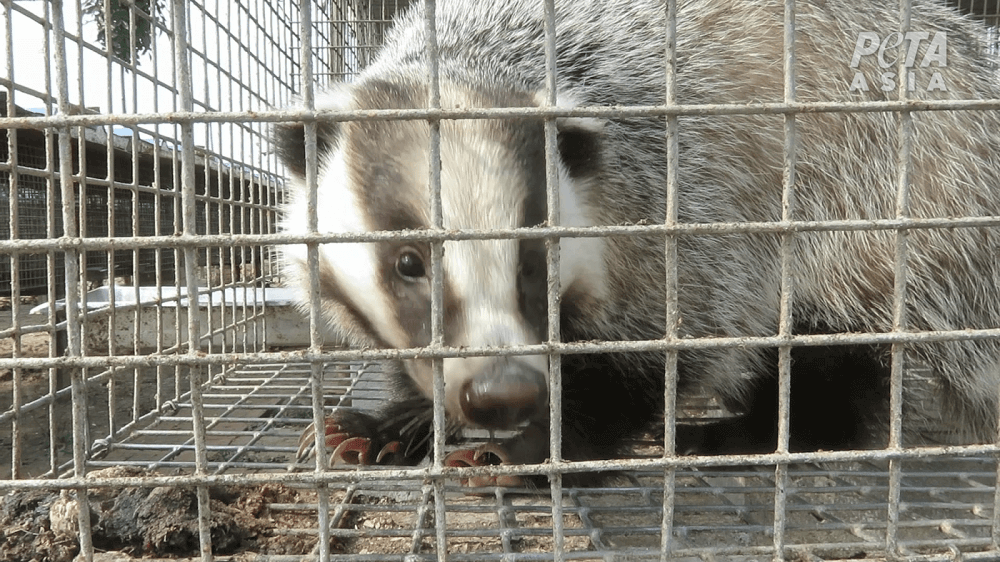
People for the Ethical Treatment of Animals (PETA) is pushing for art supply companies to stop selling paintbrushes made of badger fur. Much of this fur, such as that found in brushes at Blick Art Materials, comes from China, where a recent PETA investigation allegedly found that brush makers were trapping and capturing wild badgers—which are a protected species in China—and imprisoning them in tiny cages before violently killing them for their fur.
“Many painters may not realize it, but if they use badger-hair paintbrushes, they’re supporting terrible cruelty—buying them is no different from buying fur,” PETA’s senior director of corporate affairs, Anne Brainard, told artnet News in an email. PETA argues that badgers are highly intelligent, social creatures, that are driven insane in confinement and the inability to dig and burrow freely.
In September, the animal rights organization released a disturbing video showing the conditions in which badgers in China live and die. The undercover investigators reveal how one badger is repeatedly hit in the head with the leg of a chair before its throat is cut, and it is left to bleed out. PETA also condemns the exploitative conditions for brush factories’ human workers, who often make well below the minimum wage.
“The art community has always been at the vanguard of the social justice movement,” Brainard said. “When it comes to cruelty in the brush industry, artists have the power to create a kinder, more compassionate future for animals. For the sake of badgers suffering on farms, they should buy only synthetic brushes.”
In response to the footage, Procter & Gamble announced that it would no longer use badger hair to produce shaving brushes. Spokesperson Scott Heid told Bloomberg that “while we have no evidence that any of our suppliers are engaging in these types of methods, we believe we can play a role in helping to stop such practices.”
Blick Art Materials, however, has so far not changed its position. “Blick has no evidence that suggests animals used by our vendors in the manufacturing of their products were treated unethically,” the company said in a statement issued in September. “We are committed to working with our vendors to make sure the components of the products we sell are ethically sourced and believe we can influence them to be vigilant in their oversight to help end these irresponsible practices.”
But PETA argues that even if the brushes are produced in other countries, most badger fur comes from China, and there is no way to know that the animals have not been mistreated to produce a badger hair brush.
Badger fur is thinner at the root and thicker at the point, making the bushy-bristled brushes good for seamlessly blending paint.
Badger brushes. Photo courtesy of Gregory Daniels Fine Arts.
“Typically used for oil painting, badger hair is coarse yet soft making it ideal for stippling and texture work,” reads a product description for a badger hair paintbrush for sale at Rosemary and Co, a British company that sells handmade paintbrushes.
But PETA thinks the need for fur brushes is over.
“Painters can achieve stunning results using cruelty-free, synthetic alternatives, which are available in art-supply stores around the world,” said Brainard. “Synthetics have many advantages over animal-hair brushes. For example, they’re more resistant to damage caused by solvents, insect, and paints. They’re easier to clean, too, because unlike those made from animal hair, they don’t have microscopic scales that trap paint.”
Blick agrees with PETA that synthetic brushes have come a long way: “While early-generation synthetics may have lacked the ability to hold and consistently lay down paint, many of the newer alternatives more closely match the characteristics and working properties desired by artists.”
The company hopes that artists will gradually phase out the use of natural brushes as they become more accustomed to synthetic alternatives. “Product education has always been a top priority at Blick,” the company said. “We continue to educate our customers about today’s better-performing synthetic alternatives to natural brush hair.”